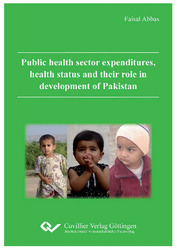| Departments | |
|---|---|
| Book Series (97) |
1381
|
| Nachhaltigkeit |
3
|
| Gesundheitswesen |
1
|
| Humanities |
2370
|
| Natural Sciences |
5407
|
| Mathematics | 228 |
| Informatics | 319 |
| Physics | 980 |
| Chemistry | 1364 |
| Geosciences | 131 |
| Human medicine | 243 |
| Stomatology | 10 |
| Veterinary medicine | 108 |
| Pharmacy | 147 |
| Biology | 835 |
| Biochemistry, molecular biology, gene technology | 121 |
| Biophysics | 25 |
| Domestic and nutritional science | 45 |
| Agricultural science | 1005 |
| Forest science | 201 |
| Horticultural science | 20 |
| Environmental research, ecology and landscape conservation | 148 |
| Engineering |
1798
|
| Common |
98
|
|
Leitlinien Unfallchirurgie
5. Auflage bestellen |
|
Advanced Search
Public health sector expenditures, health status and their role in development of Pakistan (English shop)
Faisal Abbas (Author)Preview
Table of Contents, Datei (37 KB)
Extract, Datei (60 KB)
Health Expenditures, Economic Development, Pakistan, co integration
| ISBN-13 (Printausgabe) | 3869555920 |
| ISBN-13 (Hard Copy) | 9783869555928 |
| ISBN-13 (eBook) | 9783736935921 |
| Language | English |
| Page Number | 172 |
| Edition | 1 Aufl. |
| Volume | 0 |
| Publication Place | Göttingen |
| Place of Dissertation | Universität Bonn |
| Publication Date | 2010-12-13 |
| General Categorization | Dissertation |
| Departments |
Agricultural science
|
| Keywords | Health is one of the basic capabilities that generate economic freedom. Better health status is describedas an indicator of economic success and failure of the nations. The availability of health care servicesand the physical, biological, epidemiological and socio economic environment in which a person live,broadly determines disease pattern, health status and therefore the quality of life. Despite of economicimprovement, social and demographic indicators in Pakistan presents a dismal picture. Pakistan stillhas one of the highest infant mortality rates and low (female) life expectancy compared with the otherdeveloping countries of comparable income level. Keeping in view the likely role that health can play,this dissertation aims at empirically estimating the health related variables and their impact oneconomic development of Pakistan. This dissertation aims at empirically estimating the role ofdifferent macroeconomic and policy relevant factors affecting public health spending and health statusin Pakistan over time. An attempt has been made to see the likely impact of health related variables likehealth status and per capita calorie availability on economic development using mainly health demandfunction and health production function. Time series data of Pakistan from 1972 to 2008 is usedemploying Johansen cointegration methodology, long run income elasticity of health expenditures inPakistan is estimated. Contrary to the estimates for most of the industrialized countries, incomeelasticity of public health expenditures in Pakistan is less than unity while the short run elasticity iseven negative.Unemployment and urbanization has a strong negative impact on health expenditures in the long runbut urbanization is not significant in short run. Furthermore, using cointegration and Granger bivariatecausality analysis for health status of the population it is estimates that per capita health expendituresare negatively related with infant mortality rate and positively related with female life expectancy. Aninteresting result is reinforcing relationship between fertility and mortality rate in Pakistan verifying themodern economic theory of population. The curative measure of health care system that is doctorpopulation ratio is important factor affecting positively to the female life expectancy and negatively toinfant mortality. Another modeling strategy efficiency wage hypothesis is tested using productionfunction framework. The results of nutrition availability are compared with that of life expectancy,fertility, health expenditures and mortality. It is estimated that the magnitude of calorie availability isstronger on per capita income relative to life expectancy, infant mortality, public health expendituresand fertility. One way causality is running from per capita calorie availability to per capita income.It is concluded based on these results that health sector is interlinked with socio-economic developmenttherefore; health policy must not see the health services in isolation but in an integrated manner toachieve the broader goals of poverty reduction, human capital format ion and economic development.The results support the hypothesis of inc reasing public investments in health. The role of nutrition inagrarian economy like Pakistan is robust. Government has to ensure the smooth supply of food andnutrition to the population for increasing their living standard and productivity. Policies that promotesocial inclusion by increasing employment will help in improving health status of the population. |








